- Home
- William Shakespeare
Troilus and Cressida Page 4
Troilus and Cressida Read online
Page 4
But sorrow, that is couched37 in seeming gladness
Is like that mirth fate turns to sudden sadness.
PANDARUS An39 her hair were not somewhat darker than
Helen’s — well, go to40 — there were no more comparison
between the women. But, for my part, she is my kinswoman:
I would42 not, as they term it, praise her, but I would somebody
had heard her talk yesterday, as I did. I will not dispraise43 your
sister Cassandra’s wit44, but—
TROILUS O Pandarus! I tell thee, Pandarus —
When I do tell thee, there my hopes lie drowned,
Reply not in how many fathoms47 deep
They lie indrenched48. I tell thee I am mad
In Cressid’s love49. Thou answer’st she is fair,
Pour’st in the open ulcer of my heart
Her eyes, her hair, her cheek, her gait, her voice,
Handlest52 in thy discourse, O, that her hand
In whose comparison53 all whites are ink
Writing their own reproach, to54 whose soft seizure
The cygnet55’s down is harsh and spirit of sense
Hard as the palm of ploughman: this thou tell’st me —
As true thou tell’st me — when I say I love her,
But, saying thus, instead of oil and balm58,
Thou lay’st in every gash59 that love hath given me
The knife that made it.
PANDARUS I speak no more than truth.
TROILUS Thou dost not speak so much.
PANDARUS Faith, I’ll not meddle in’t. Let her be as she is: if she
be fair, ’tis the better for her: an she be not, she has the
mends65 in her own hands.
TROILUS Good Pandarus, how now, Pandarus?
PANDARUS I have had my labour for my travail67: ill-thought on
of her and ill-thought on of you: gone between and between,
but small thanks for my labour.
TROILUS What, art thou angry, Pandarus? What, with me?
PANDARUS Because she’s kin to me, therefore she’s not so fair
as Helen: an she were not kin to me, she would be as fair on
Friday as Helen is on Sunday72. But what care I? I care not an
she were a blackamoor74: ’tis all one to me.
TROILUS Say I she is not fair75?
PANDARUS I do not care whether you do or no. She’s a fool to
stay behind her father77: let her to the Greeks, and so I’ll tell
her the next time I see her. For my part, I’ll meddle nor make
no more i’th’matter.
TROILUS Pandarus—
PANDARUS Not I.
TROILUS Sweet Pandarus—
PANDARUS Pray you speak no more to me: I will leave all as I
found it, and there an end.
Exit Pandarus
Sound alarum
TROILUS Peace, you ungracious85 clamours, peace, rude sounds!
Fools on both sides! Helen must needs be fair
When with your blood you daily paint87 her thus.
I cannot fight upon this argument88:
It is too starved89 a subject for my sword.
But Pandarus — O gods, how do you plague me!
I cannot come to Cressid but by Pandar,
And he’s as tetchy92 to be wooed to woo
As she is stubborn, chaste, against all suit93.
Tell me, Apollo94, for thy Daphne’s love,
What Cressid is, what Pandar, and what we95?
Her bed is India96: there she lies, a pearl.
Between our Ilium97 and where she resides,
Let it be called the wild and wand’ring flood98,
Ourself the merchant99, and this sailing Pandar
Our doubtful hope, our convoy100 and our bark.
Alarum. Enter Aeneas
AENEAS How now, Prince Troilus? Wherefore not afield?101
TROILUS Because not there102: this woman’s answer sorts,
For womanish it is to be from thence.
What news, Aeneas, from the field today?
AENEAS That Paris is returnèd home and hurt.
TROILUS By whom, Aeneas?
AENEAS Troilus, by Menelaus.
TROILUS Let Paris bleed, ’tis but a scar to scorn108:
Paris is gored with Menelaus’ horn109.
Alarum
AENEAS Hark, what good sport110 is out of town today!
TROILUS Better at home, if ‘would I might’ were ‘may’.
But to the sport abroad112: are you bound thither?
AENEAS In all swift haste.
TROILUS Come, go we then together.
Exeunt
[Act 1 Scene 2]
running scene 2
Enter Cressida and her Man [Alexander]
CRESSIDA Who were those went by?
ALEXANDER Queen Hecuba and Helen.
CRESSIDA And whither go they?
ALEXANDER Up to the eastern tower,
Whose height commands as subject5 all the vale,
To see the battle. Hector, whose patience
Is as a virtue fixed7, today was moved:
He chides Andromache and struck his armourer,
And, like as9 there were husbandry in war,
Before the sun rose he was harnessed light10,
And to the field goes he, where every flower
Did as a prophet weep what it foresaw
In Hector’s wrath.
CRESSIDA What was his cause of anger?
ALEXANDER The noise15 goes, this: there is among the Greeks
A lord of Trojan blood, nephew16 to Hector:
They call him Ajax.
CRESSIDA Good18, and what of him?
ALEXANDER They say he is a very man per se19, and stands alone.
CRESSIDA So do all men, unless they are drunk, sick, or have
no legs20.
ALEXANDER This man, lady, hath robbed many beasts of their
particular additions23: he is as valiant as the lion, churlish as
the bear, slow24 as the elephant: a man into whom nature hath
so crowded humours25 that his valour is crushed into folly, his
folly sauced with discretion. There is no man hath a virtue
that he hath not a glimpse27 of, nor any man an attaint but he
carries some stain of it: he is melancholy without cause, and
merry against the hair29: he hath the joints of everything, but
everything so out of joint that he is a gouty30 Briareus, many
hands and no use, or purblinded31 Argus, all eyes and no sight.
CRESSIDA But how should this man, that makes me smile
make Hector angry?
ALEXANDER They say he yesterday coped34 Hector in the battle
and struck him down, the disdain35 and shame whereof hath
ever since kept Hector fasting and waking36.
Enter Pandarus
CRESSIDA Who comes here?
ALEXANDER Madam, your uncle Pandarus.
CRESSIDA Hector’s a gallant man.
ALEXANDER As may be in the world, lady.
PANDARUS What’s that? What’s that?
CRESSIDA Good morrow, uncle Pandarus.
PANDARUS Good morrow, cousin Cressid. What do you talk
of?— Good morrow, Alexander.— How do you, cousin?
When were you at Ilium?
CRESSIDA This morning, uncle.
PANDARUS What were you talking of when I came? Was Hector
armed and gone ere48 ye came to Ilium? Helen was not up, was
she?
CRESSIDA Hector was gone, but Helen was not up.
PANDARUS E’en so; Hector was stirring early.
CRESSIDA That were we talking of, and of his anger.
PANDARUS Was he angry?
CRESSIDA So he says here.
PANDARUS True, he was so; I know the cause too: he’ll lay
about
him55 today, I can tell them that, and there’s Troilus will
not come far behind him: let them take heed of Troilus, I can
tell them that too.
CRESSIDA What, is he angry too?
PANDARUS Who, Troilus? Troilus is the better man of the two.
CRESSIDA O Jupiter61, there’s no comparison.
PANDARUS What, not between Troilus and Hector? Do you
know a man63 if you see him?
CRESSIDA Ay, if I ever saw him before and knew him.
PANDARUS Well, I say Troilus is Troilus.
CRESSIDA Then you say as I say, for I am sure he is not Hector.
PANDARUS No, nor Hector is not Troilus in some degrees67.
CRESSIDA ’Tis just68 to each of them: he is himself.
PANDARUS Himself? Alas, poor Troilus, I would he were.
CRESSIDA So he is.
PANDARUS Condition, I had gone barefoot to India71.
CRESSIDA He is not Hector.
PANDARUS Himself? No, he’s not himself: would a73 were himself!
Well, the gods are above, time must friend74 or end. Well,
Troilus, well. I would my heart were in her body. No, Hector
is not a better man than Troilus.
CRESSIDA Excuse me77.
PANDARUS He is elder.
CRESSIDA Pardon me, pardon me.
PANDARUS Th’other’s not come to’t80; you shall tell me another
tale, when th’other’s come to’t. Hector shall not have his wit81
this year.
CRESSIDA He shall not need it if he have his own.
PANDARUS Nor his qualities.
CRESSIDA No matter.
PANDARUS Nor his beauty.
CRESSIDA ’Twould not become87 him: his own’s better.
PANDARUS You have no judgement, niece; Helen herself swore
th’other day that Troilus for a brown favour89 — for so ’tis, I
must confess — not brown neither—
CRESSIDA No, but brown91.
PANDARUS ’Faith, to say truth, brown and not brown.
CRESSIDA To say the truth, true and not true.
PANDARUS She praised his complexion above Paris.
CRESSIDA Why, Paris hath colour enough.
PANDARUS So he has.
CRESSIDA Then Troilus should97 have too much: if she praised
him above, his98 complexion is higher than his: he having
colour enough, and the other higher, is too flaming99 a praise
for a good complexion. I had as lief100 Helen’s golden tongue
had commended Troilus for a copper101 nose.
PANDARUS I swear to you, I think Helen loves him better than
Paris.
CRESSIDA Then she’s a merry Greek104 indeed.
PANDARUS Nay, I am sure she does. She came to him th’other
day into the compassed106 window — and, you know, he has
not past three or four hairs on his chin—
CRESSIDA Indeed, a tapster’s arithmetic108 may soon bring his
particulars109 therein to a total.
PANDARUS Why, he is very young, and yet will he within three
pound lift as much as his brother Hector.
CRESSIDA Is he so young a man and so old112 a lifter?
PANDARUS But to prove to you that Helen loves him, she came
and puts me her white hand to his cloven114 chin—
CRESSIDA Juno115 have mercy! How came it cloven?
PANDARUS Why, you know ’tis dimpled. I think his smiling
becomes him better than any man in all Phrygia.
CRESSIDA O, he smiles valiantly.
PANDARUS Does he not?
CRESSIDA O yes, an ’twere a cloud in autumn120.
PANDARUS Why, go to, then. But to prove to you that Helen
loves Troilus—
CRESSIDA Troilus will stand to the proof123, if you’ll prove it so.
PANDARUS Troilus? Why, he esteems her no more than I esteem
an addle125 egg.
CRESSIDA If you love an addle egg as well as you love an idle
head, you would eat chickens i’th’shell126.
PANDARUS I cannot choose but laugh to think how she tickled
his chin. Indeed, she has a marvellous129 white hand, I must
needs confess130—
CRESSIDA Without the rack131.
PANDARUS And she takes upon her to spy a white hair on his
chin.
CRESSIDA Alas, poor chin. Many a wart is richer134.
PANDARUS But there was such laughing! Queen Hecuba
laughed that136 her eyes ran o’er.
CRESSIDA With millstones137.
PANDARUS And Cassandra laughed.
CRESSIDA But there was more temperate fire under the pot139 of
her eyes: did her eyes run o’er too?
PANDARUS And Hector laughed.
CRESSIDA At what was all this laughing?
PANDARUS Marry143, at the white hair that Helen spied on Troilus’
chin.
CRESSIDA An’t had been a green145 hair, I should have laughed
too.
PANDARUS They laughed not so much at the hair as at his
pretty148 answer.
CRESSIDA What was his answer?
PANDARUS Quoth she, ‘Here’s but two and fifty hairs on your
chin, and one of them is white.’
CRESSIDA This is her question.
PANDARUS That’s true, make no question of that. ‘Two and fifty
hairs154,’ quoth he, ‘and one white: that white hair is my father,
and all the rest are his sons155.’ ‘Jupiter!’ quoth she, ‘Which of
these hairs is Paris, my husband?’ ‘The forked156 one,’ quoth
he, ‘pluck’t out, and give it him.’ But there was such
laughing, and Helen so blushed, and Paris so chafed158, and all
the rest so laughed, that it passed159.
CRESSIDA So let it now160, for it has been a great while going by.
PANDARUS Well, cousin. I told you a thing yesterday: think on’t.
CRESSIDA So I do.
PANDARUS I’ll be sworn ’tis true, he will weep you, an ’twere a
man born in April163.
Sound a retreat
CRESSIDA And I’ll spring165 up in his tears, an ’twere a nettle
against May.
PANDARUS Hark, they are coming from the field: shall we stand
up here and see them as they pass toward Ilium? Good niece,
do, sweet niece Cressida.
CRESSIDA At your pleasure.
PANDARUS Here, here, here’s an excellent place, here we may
see most bravely172. I’ll tell you them all by their names as they
pass by, but mark173 Troilus above the rest.
Enter Aeneas [and passes over the stage]
CRESSIDA Speak not so loud.
PANDARUS That’s Aeneas. Is not that a brave175 man? He’s one of
the flowers of Troy, I can tell you. But mark Troilus: you shall
see anon177.
CRESSIDA Who’s that?
Enter Antenor [and passes over the stage]
PANDARUS That’s Antenor. He has a shrewd179 wit, I can tell you,
and he’s a man good enough: he’s one o’th’soundest
judgement180 in Troy whosoever181, and a proper man of person.
When comes Troilus? I’ll show you Troilus anon: if he see
me, you shall see him nod at me.
CRESSIDA Will he give you the nod184?
PANDARUS You shall see.
CRESSIDA If he do, the rich shall have more186.
Enter Hector [and passes over the stage]
PANDARUS That’s Hector, that, that, look you, that there’s a
fellow! Go thy way188, Hector! There’s a brave man, niece. O
brave Hector! Look how he looks! There’s a countenance189. Is’t
 
; not a brave man?
CRESSIDA O brave man!
PANDARUS Is a not? It does a192 man’s heart good. Look you what
hacks193 are on his helmet. Look you yonder, do you see? Look
you there? There’s no jesting194, there’s laying on, take’t off
who will, as they say. There be hacks!
CRESSIDA Be those with swords196?
Enter Paris [and passes over the stage]
PANDARUS Swords, anything, he cares not: an the devil come to
him, it’s all one. By God’s lid198, it does one’s heart good. Yonder
comes Paris, yonder comes Paris. Look ye yonder, niece. Is’t
not a gallant man too, is’t not? Why, this is brave now. Who
said he came hurt home today? He’s not hurt. Why, this will
do Helen’s heart good now, ha? Would I could see Troilus
now. You shall see Troilus anon.
CRESSIDA Who’s that?
Enter Helenus [and passes over the stage]
PANDARUS That’s Helenus. I marvel205 where Troilus is. That’s
Helenus, I think he206 went not forth today: that’s Helenus.
CRESSIDA Can Helenus fight, uncle?
PANDARUS Helenus? No. Yes, he’ll fight indifferent208 well. I
marvel where Troilus is. Hark, do you not hear the people
cry ‘Troilus’? Helenus is a priest.
CRESSIDA What sneaking211 fellow comes yonder?
Enter Troilus [and passes over the stage]
PANDARUS Where? Yonder? That’s Deiphobus. ’Tis Troilus!
There’s a man, niece!—
Hem!214 Brave Troilus, the prince of chivalry!
CRESSIDA Peace, for shame, peace!
PANDARUS Mark him, note him. O brave Troilus! Look well
upon him, niece. Look you how his sword is bloodied, and his
helm218 more hacked than Hector’s, and how he looks, and
how he goes219. O admirable youth! He ne’er saw three and
twenty. Go thy way, Troilus, go thy way! Had I a sister were a
grace221, or a daughter a goddess, he should take his choice. O
admirable man! Paris? Paris is dirt to222 him, and I warrant
Helen, to change223, would give money to boot.
Enter Common Soldiers [and pass over the stage]
CRESSIDA Here come more.
PANDARUS Asses, fools, dolts. Chaff and bran225, chaff and bran;
porridge after meat226. I could live and die i’th’eyes of Troilus.
Ne’er look, ne’er look. The eagles are gone: crows and daws227,
crows and daws! I had rather be such a man as Troilus than
Agamemnon and all Greece.
CRESSIDA There is among the Greeks Achilles, a better man
than Troilus.
PANDARUS Achilles? A drayman232, a porter, a very camel.

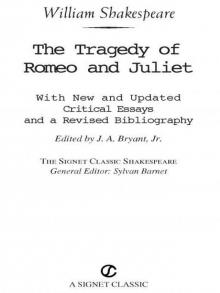 Romeo and Juliet
Romeo and Juliet As You Like It (Folger Shakespeare Library)
As You Like It (Folger Shakespeare Library)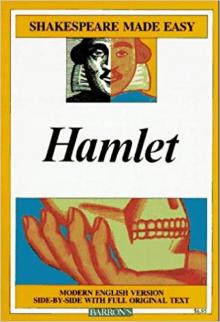 Hamlet
Hamlet Richard II (Folger Shakespeare Library)
Richard II (Folger Shakespeare Library) Macbeth
Macbeth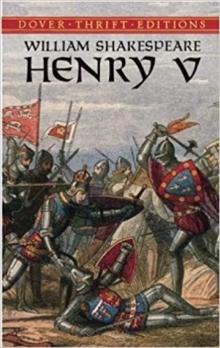 Henry V
Henry V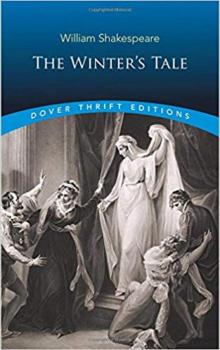 The Winter's Tale
The Winter's Tale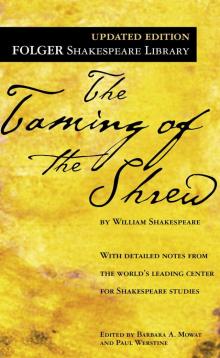 The Taming of the Shrew
The Taming of the Shrew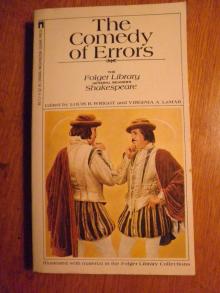 The Comedy of Errors
The Comedy of Errors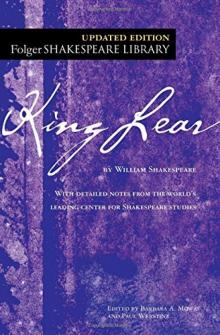 King Lear (Folger Shakespeare Library)
King Lear (Folger Shakespeare Library)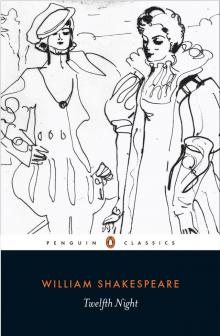 Twelfth Night
Twelfth Night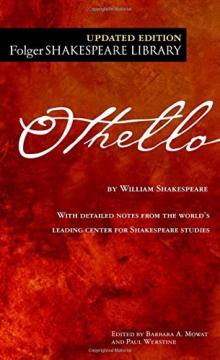 Othello
Othello The Two Gentlemen of Verona
The Two Gentlemen of Verona Henry IV, Part 1 (Folger Shakespeare Library)
Henry IV, Part 1 (Folger Shakespeare Library)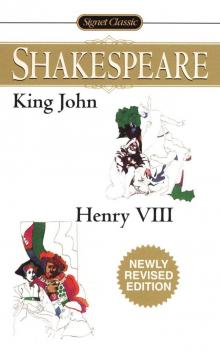 King John/Henry VIII (Signet Classics)
King John/Henry VIII (Signet Classics)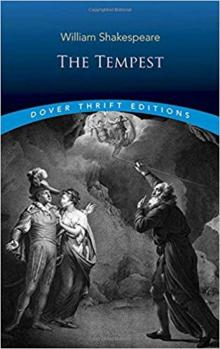 The Tempest
The Tempest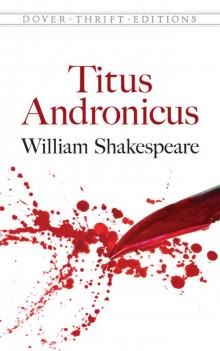 Titus Andronicus (Dover Publications)
Titus Andronicus (Dover Publications)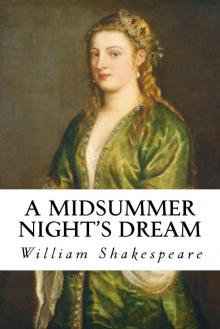 A Midsummer Night's Dream
A Midsummer Night's Dream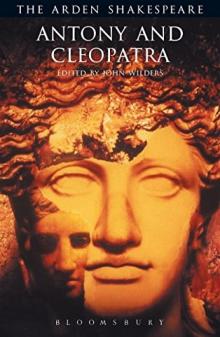 Antony and Cleopatra (Arden Shakespeare: Third Series)
Antony and Cleopatra (Arden Shakespeare: Third Series)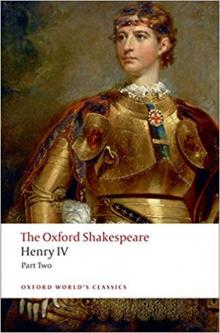 The Oxford Shakespeare: Henry IV, Part 2 (Oxford World's Classics)
The Oxford Shakespeare: Henry IV, Part 2 (Oxford World's Classics)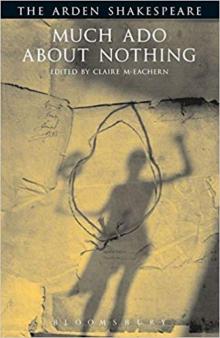 Much Ado About Nothing (Arden Shakespeare: Third Series)
Much Ado About Nothing (Arden Shakespeare: Third Series) All's Well That Ends Well
All's Well That Ends Well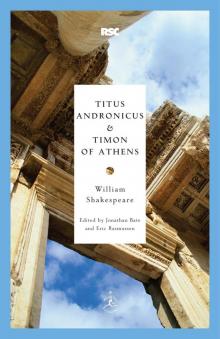 Titus Andronicus & Timon of Athens
Titus Andronicus & Timon of Athens Richard III (Modern Library Classics)
Richard III (Modern Library Classics) Coriolanus
Coriolanus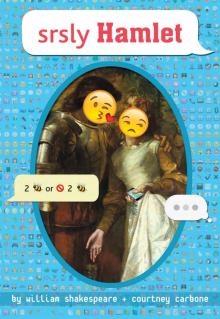 srsly Hamlet (OMG Shakespeare)
srsly Hamlet (OMG Shakespeare)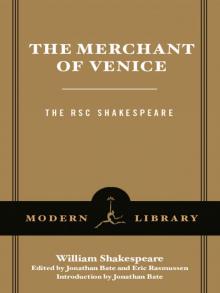 The Merchant of Venice
The Merchant of Venice Richard III
Richard III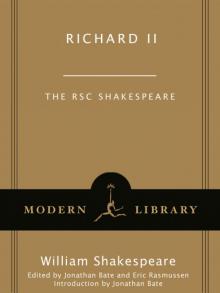 Richard II
Richard II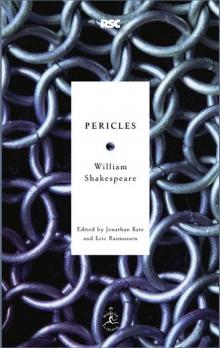 Pericles
Pericles As You Like It
As You Like It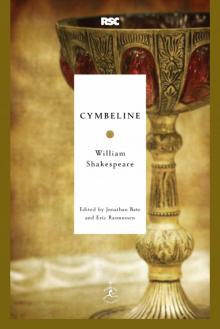 Cymbeline
Cymbeline Alls Wel that ends Well
Alls Wel that ends Well YOLO Juliet
YOLO Juliet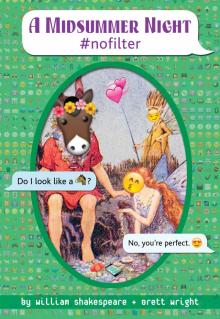 A Midsummer Night #nofilter
A Midsummer Night #nofilter Love's Labour's Lost
Love's Labour's Lost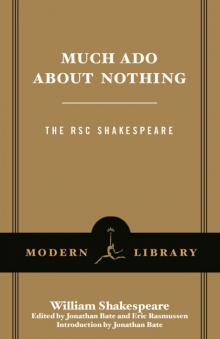 Much Ado About Nothing
Much Ado About Nothing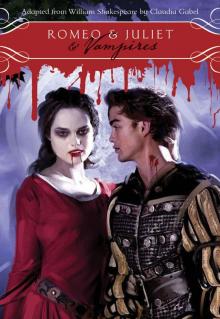 Romeo & Juliet & Vampires
Romeo & Juliet & Vampires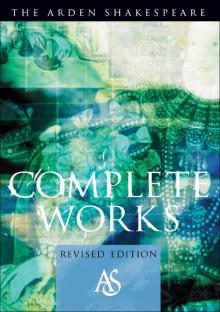 The Arden Shakespeare Complete Works
The Arden Shakespeare Complete Works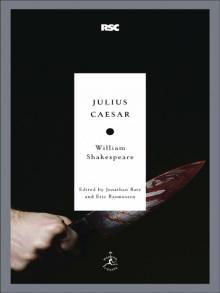 Julius Caesar
Julius Caesar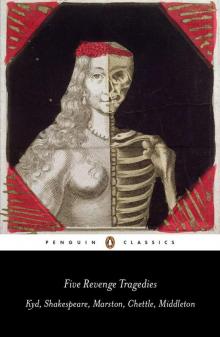 Five Revenge Tragedies: The Spanish Tragedy, Hamlet, Antonio's Revenge, The Tragedy of Hoffman, The Revenger's Tragedy (Penguin Classics)
Five Revenge Tragedies: The Spanish Tragedy, Hamlet, Antonio's Revenge, The Tragedy of Hoffman, The Revenger's Tragedy (Penguin Classics)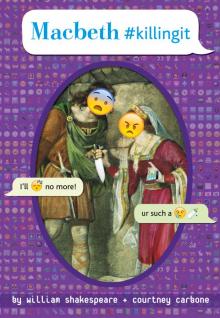 Macbeth #killingit
Macbeth #killingit The Oxford Shakespeare: The Complete Works
The Oxford Shakespeare: The Complete Works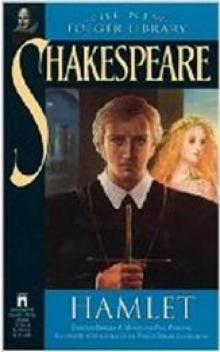 Hamlet, Prince of Denmark (Collins edition)
Hamlet, Prince of Denmark (Collins edition) King John & Henry VIII
King John & Henry VIII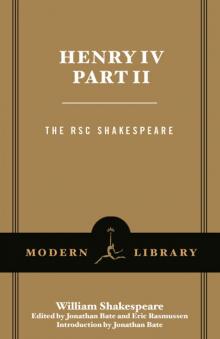 Henry IV, Part 2
Henry IV, Part 2 Complete Plays, The
Complete Plays, The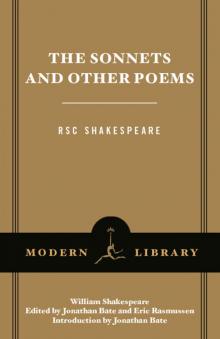 The Sonnets and Other Poems
The Sonnets and Other Poems Antony and Cleopatra
Antony and Cleopatra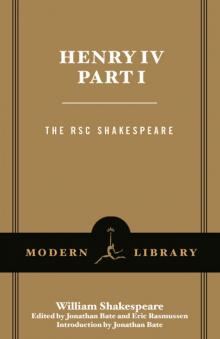 Henry IV, Part 1
Henry IV, Part 1 Is This a Dagger Which I See Before Me?
Is This a Dagger Which I See Before Me? The Complete Works of William Shakespeare In Plain and Simple English (Translated)
The Complete Works of William Shakespeare In Plain and Simple English (Translated)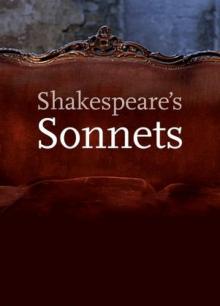 The Sonnets
The Sonnets